
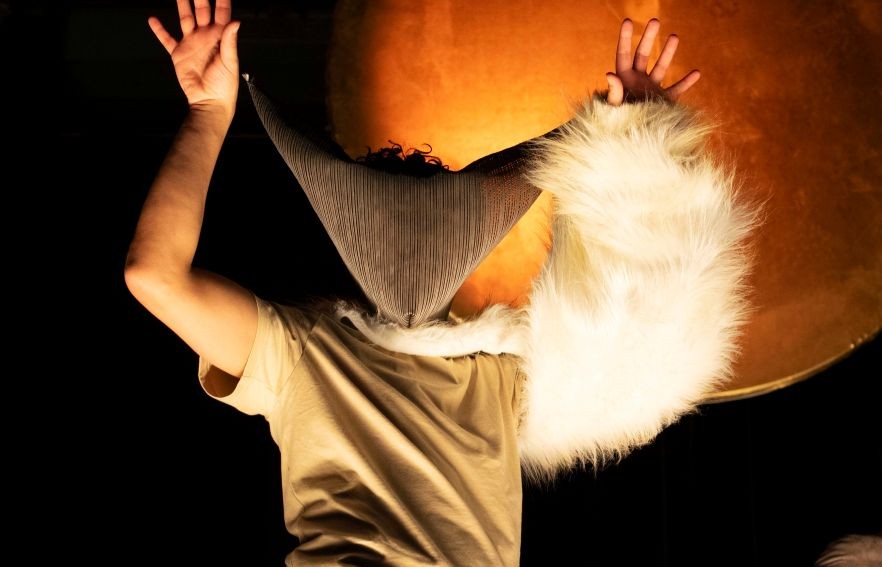
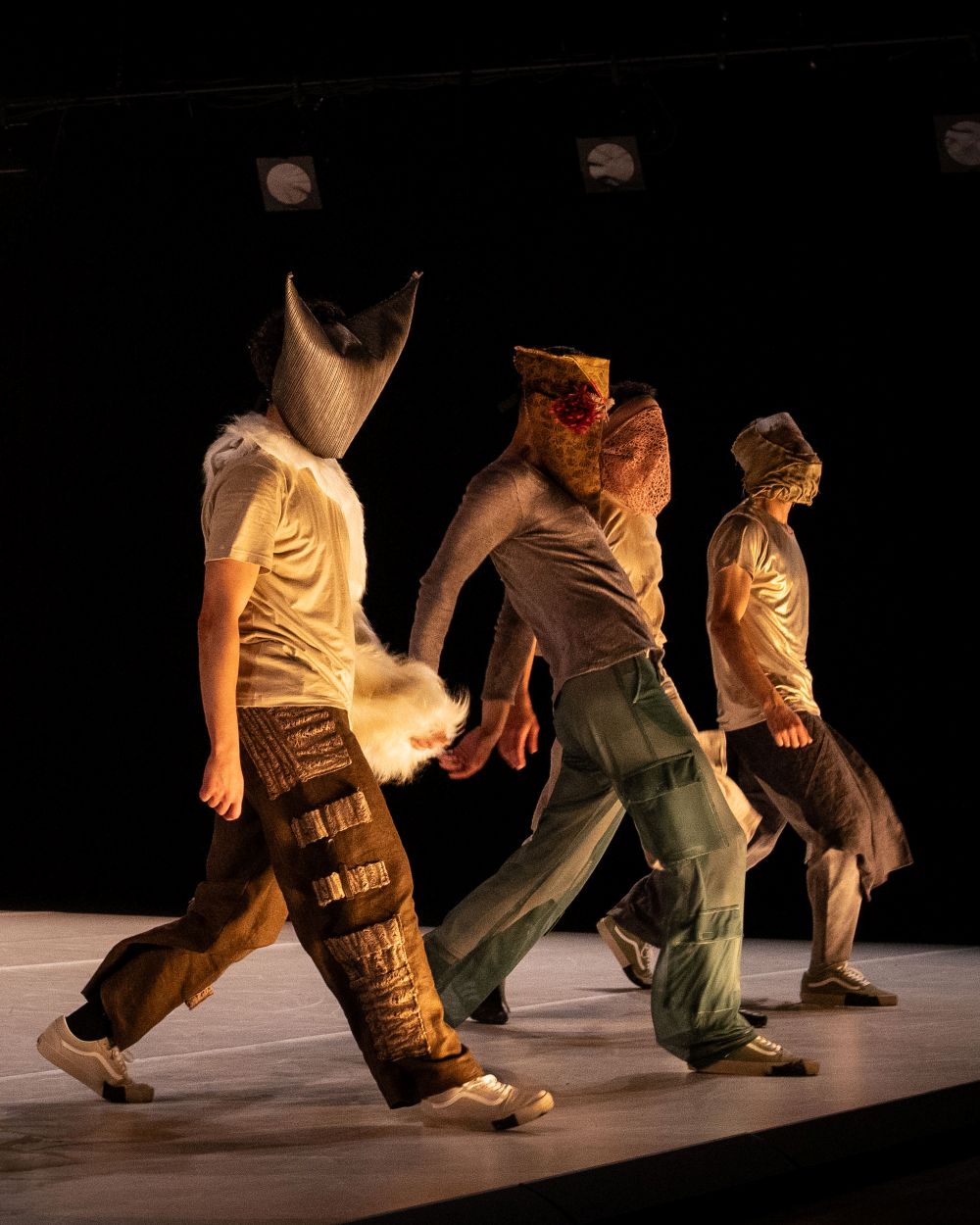
Magec / the Desert
Magec / the Desert is het tweede deel van een nieuwe trilogie van Radouan Mriziga. De trilogie is geïnspireerd door mythologische verhalen uit de Amazigh-cultuur, vooral verhalen die hun oorsprong kennen in het Atlasgebergte in Noord-Afrika. Deze verhalen hebben verbanden met spiritualiteit, kunst, filosofie, ambacht en wetenschap.
In zijn werk zet Mriziga zijn praktijk van collectieve creatie voort, waarbij ritme, tekst, beweging en geluid met elkaar verweven worden door de bijdragen van zijn medewerkers. De choreografie ontvouwt zich als een polyfonie van perspectieven, waarbij individuele ervaringen elkaar kruisen om een gedeelde, veelzijdige visie te vormen. Net als de gelaagde texturen van de woestijn weerstaat de voorstelling singulariteit en biedt in plaats daarvan een complexiteit die tegelijkertijd intellectueel en diep zintuiglijk is.
//
Magec / the Desert is the second part of a new trilogy by Radouan Mriziga, inspired by mythological stories from the Amazigh culture, and in particular those who have a close relationship with the Atlas Mountains in North Africa, in terms of spirituality, art, philosophy, craft, and science.
In his work, Mriziga continues his practice of collective creation, where rhythm, text, movement, and sound become interwoven through the contributions of his collaborators. The choreography unfolds as a polyphony of perspectives, where individual experiences intersect to form a shared, multifaceted vision. Like the layered textures of the desert, the performance resists singularity, instead offering a complexity that is at once intellectual and deeply sensory.
CREDITS
Concept, choreography, & scenography Radouan Mriziga
Created with and performed by Robin Haghi, Bilal El Had, Hichem Chebli, Feteh Khiari, Sofiane El Boukhari, Nathan Félix
Music & sound design Deena Abdelwahed
Video Senda Jebali
Technical director Zouheir Atbane
Costume design Salah Barka
Research Maïa Tellit Hawad
Text Mahmoudan Hawad
Production A7LA5
Photography Louka Van Roy
Co-production Sharjah Art Foundation, Kunstenfestivaldesarts, Festival d'Automne à Paris, De Singel, Festival d’Avignon, Pact Zollverein, Culturescapes, Tanz Im August/HAU Hebbel am Ufer
Met de steun van de Vlaamse Gemeenschapscommissie (VGC), de Vlaamse Overheid en de Tax Shelter van de Belgische Federale Overheid.
Dank aan Destelheide en L’Art Rue - Festival Dream City.
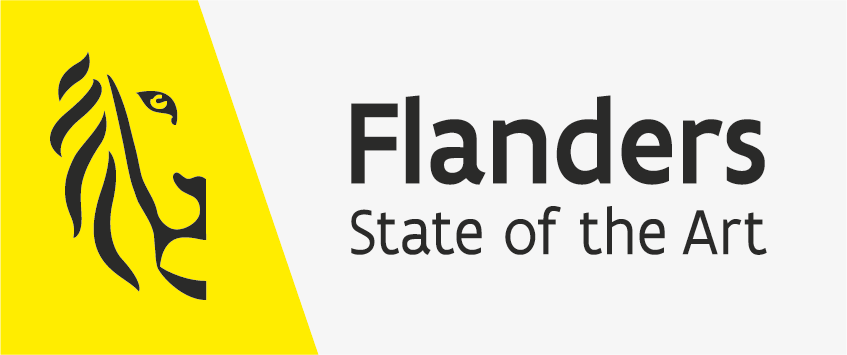
Il Cimento dell’Armonia e dell’Inventione
Anne Teresa De Keersmaeker en Radouan Mriziga inspireren zich op ‘De vier jaargetijden’ van Antonio Vivaldi. Het uitgangspunt voor deze nieuwe voorstelling is de prachtige opname van Vivaldi’s stuk door violiste Amandine Beyer en haar ensemble Gli Incogniti.
‘De vier jaargetijden’ is een van de bekendste, meest iconische en vaakst gereproduceerde muziekstukken; een echte ‘hit’ uit het klassieke repertoire. Het is ook een prachtige ode aan de natuur. De Keersmaeker en Mriziga, die eerder al samenwerkten aan ‘3ird5 @ W9rk’ (2020), delen naast een grote interesse in de observatie van de natuur, geometrie en belichaamde abstractie ook een bezorgdheid om onze veranderende en steeds meer verontrustende relatie met onze natuurlijke omgeving. De vier jaargetijden inspireert de choreografen tot een verdere verkenning van patronen, structuren en elementen uit de natuur en van astronomische configuraties als mogelijke uitgangspunten voor een choreografie. Stilstaan bij de vier jaargetijden maakt ook de urgentie van de klimaatcrisis pijnlijk duidelijk. Kunnen we vandaag nog spreken over vier seizoenen?
Vivaldi componeerde ‘De vier jaargetijden’ exact driehonderd jaar geleden in het Middellandse Zeegebied, waar verschillende continenten elkaar ontmoeten. In die zin nodigt Vivaldi’s compositie ook uit tot reflectie over de geopolitieke dynamiek in de regio en de manier waarop kennis, macht en geschiedenis zich verspreiden.
In ‘Il Cimento dell’Armonia e dell’Inventione’ worden verschillende lijnen met elkaar vervlochten om tot een unieke choreografische schriftuur te komen. Het stuk grijpt terug naar de kern, de structuur van Vivaldi’s De vier jaargetijden en de vele associaties en emoties die dit muziekstuk oproept, terwijl het gestalte geeft aan een choreografisch contrapunt. De voorstelling onderzoekt ook het contemplatieve aspect van De vier jaargetijden, dat schuilt in de vertrouwdheid van het muziekstuk en de vertrouwdheid van de natuur.
///
Anne Teresa De Keersmaeker and Radouan Mriziga explore Antonio Vivaldi’s ‘The Four Seasons’, starting from the exquisite recording of Vivaldi’s composition by virtuosic violinist Amandine Beyer and her ensemble Gli Incogniti.
‘The Four Seasons’ is one of the most well-known, iconic and reproduced pieces of music; a veritable ‘hit’ of the classical repertoire. It is also a striking ode to nature. De Keersmaeker and Mriziga, who previously collaborated on 3ird5 @ W9rk (2020), share a keen interest in the observation of nature, geometry, and embodied abstraction. They also share a concern with our changing and increasingly troubling relationship to our natural environment. Contemplating the four seasons in nature by contemplating the nature of this musical composition not only inspires further explorations of patterns present in the natural world and celestial configurations as possible starting points for choreography, it also vividly brings to the surface the urgency of the impending climate crisis. Do we still have four seasons? In addition, Vivaldi wrote this music three hundred years ago in the Mediterranean, a region at the intersection of different continents. ‘The Four Seasons’ thus also invites reflection on the circulations of knowledge, power, and histories this region represents.
In ‘Il Cimento dell’Armonia e dell’Inventione’ multiple strands come together to create a unique choreographic language. The piece aims to return to the core, the structure of Vivaldi’s famous composition and the many associations and emotions it evokes, while offering a choreographic counterpoint to it. At the same time the dance underscores that there may be something contemplative to be found in ‘The Four Seasons’ in its familiarity, and in the familiarity of nature.
CREDITS
Concept, Choreography, Set and Light Design Anne Teresa De Keersmaeker, Radouan MrizigaCreated with and Performed by Boštjan Antončič, Nassim Baddag, Lav Crnčević, José Paulo dos Santos
Music Antonio Vivaldi, Amandine Beyer, Gli Incogniti
Costume Design Aouatif Boulaich
Rehearsal Director Eleni Ellada Damianou
Musical Analysis Amandine Beyer
Production Rosas
Co-Production Concertgebouw Brugge, De Munt/La Monnaie, Berliner Festspiele, Charleroi Danse, Festival d'Automne à Paris, Festival de Marseille, ImPulsTanz Vienna, Sadler's Wells London, Théâtre de la Ville Paris
With the support of Dance Reflections by Van Cleef & Arpels
and the Tax Shelter of the Belgian Federal Government, in collaboration with Casa Kafka Pictures –Belfius. Rosas is supported by the Flemish Community and the Flemish Community Commission (VGC).
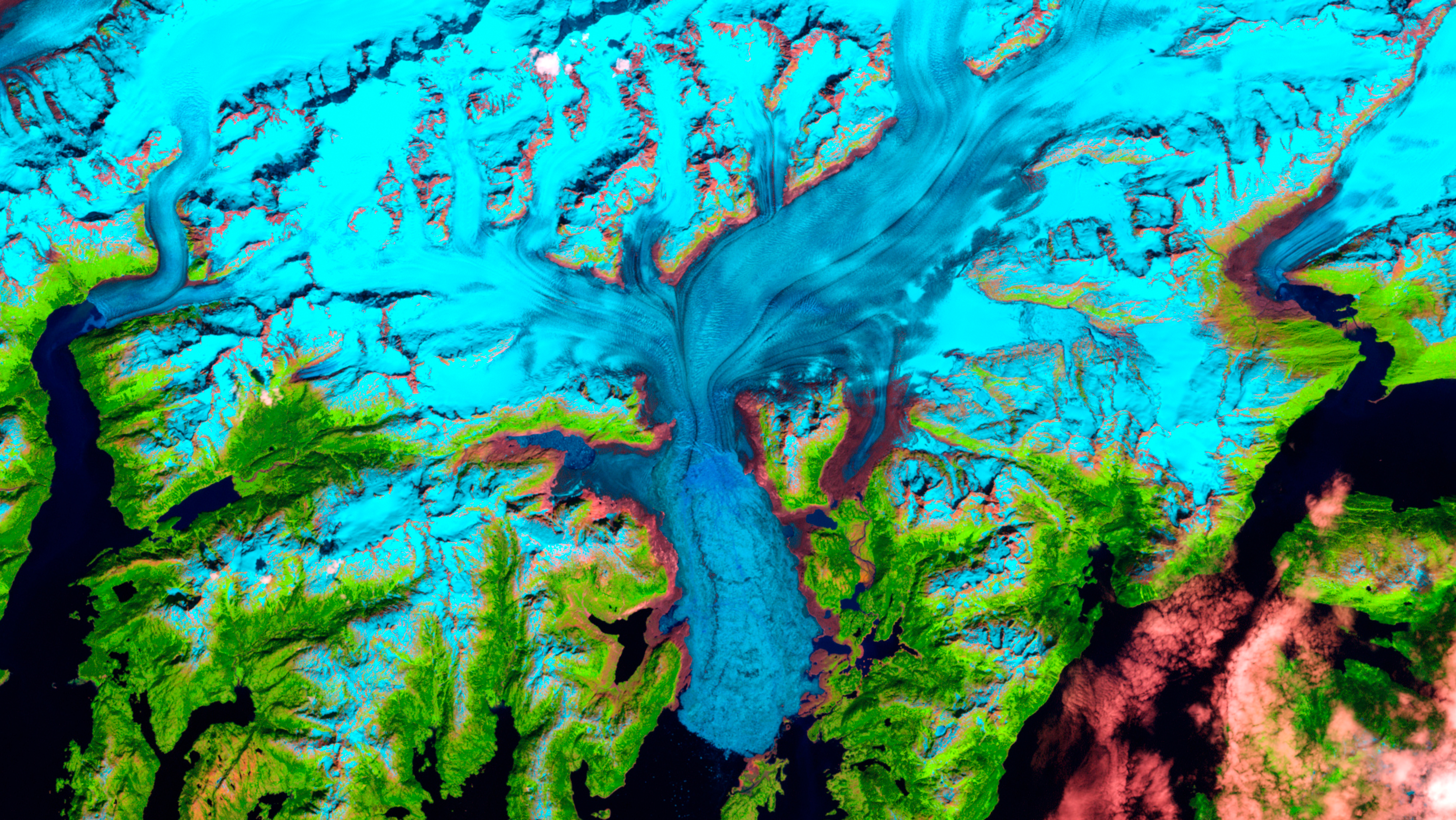
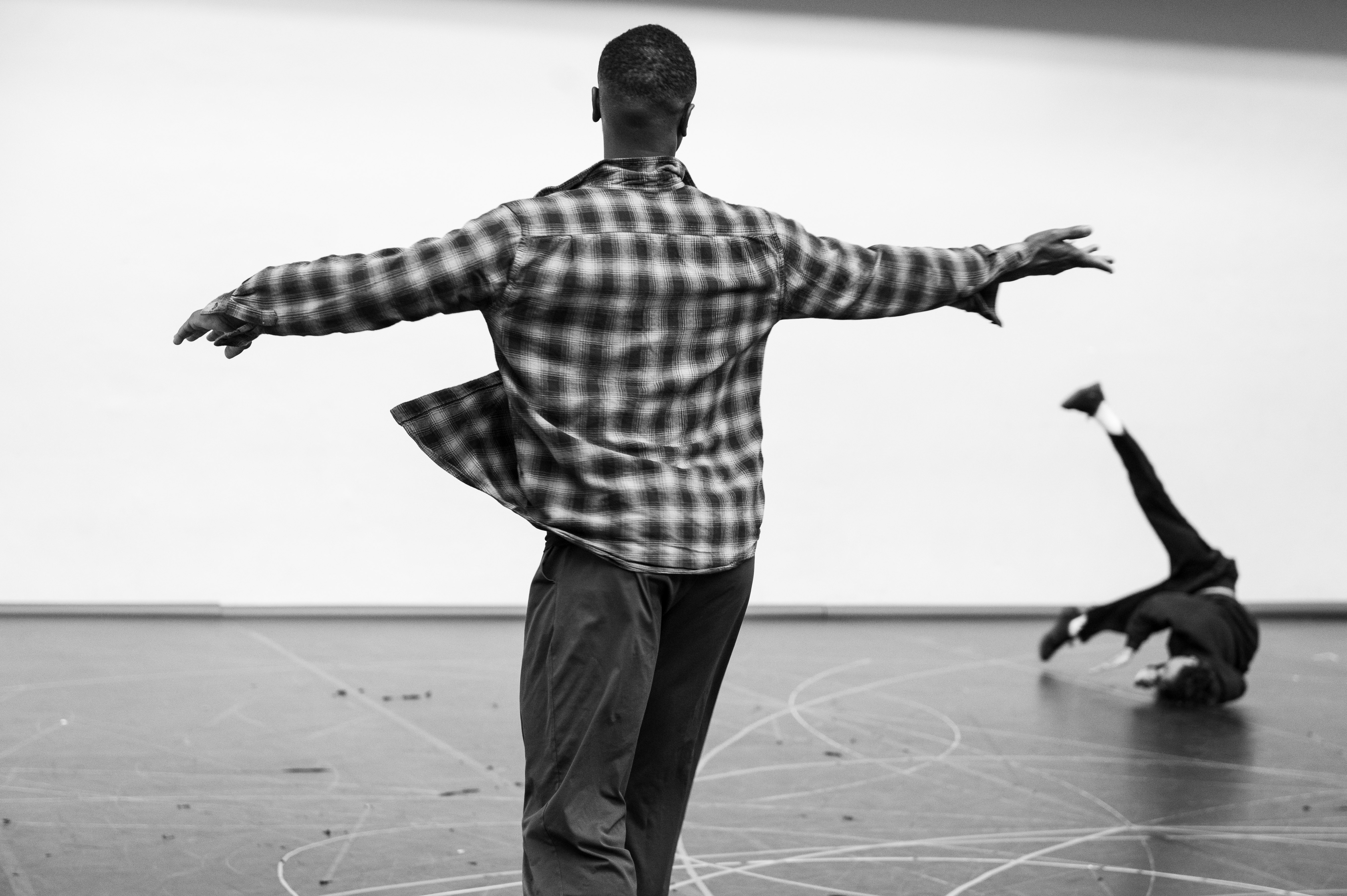


Atlas / the Mountain
Atlas / the Mountain is het eerste deel van een nieuwe trilogie van Radouan Mriziga. De trilogie is geïnspireerd door mythologische verhalen uit de Amazigh-cultuur, vooral verhalen die hun oorsprong kennen in het Atlasgebergte in Noord-Afrika. Deze verhalen hebben verbanden met spiritualiteit, kunst, filosofie, ambacht en wetenschap.
Met Atlas / the Mountain creëert Mriziga een solovoorstelling. Hij onderzoekt de complexe lagen van betekenis rondom het natuurlijke milieu van de berg. De berg fungeert als zowel romantisch als politiek symbool en vertegenwoordigt een toevluchtsoord in tijden van oorlog en onderdrukking.
//
Atlas / the Mountain is the first part of a new trilogy by Radouan Mriziga, inspired by mythological stories from the Amazigh culture, and in particular those who have a close relationship with the Atlas Mountains in North Africa, in terms of spirituality, art, philosophy, craft, and science.
In Atlas / the Mountain, Mriziga has crafted a solo performance that delves into the intricate layers of significance surrounding the mountain's natural environment, as both a romantic and a political symbol, offering refuge and protection during times of war and oppression.
CREDITS
Choreographer and Performer Radouan Mriziga
Coordination Synda Jebali
Assistant Mohamed Ridha Ben Khoud
Sound Creation Zouheir Atbane
Costume Salah Barka with the assistance of Emna Bououn and Rim Abbes
Production L’Art Rue & A7LA5
Co-production Festival d'Automne à Paris (Paris- FR), De Singel (Antwerp - BE), Theater Freiburg (Freiburg - DE)
LIBYA
Imperiale geschiedenis maakt vaak gebruik van het idee van tijd als iets lineairs, waarbij het verleden, het heden en de toekomst als afzonderlijke eenheden worden gezien. Radouan Mriziga probeert deze beperkte kijk op tijd uit te dagen in zijn werk over Libië, via performance, dans, rap, verhalen, taal en zang. In zijn werk tracht Mriziga de geschiedenis opnieuw toe te eigenen, deze te verbinden met het heden en open te stellen voor verschillende perspectieven.
De nalatenschap van Noord-Afrikaanse ambachten, uitvindingen, wetenschap, culturen en filosofie wordt op een unieke manier doorgegeven via de energie van negen performers. Deze nalatenschap resoneert met de familie van Mriziga en met vormen van Westerse kennis, en wordt gevierd in een menselijke en artistieke vertelling. In plaats van didactisch of documentair, pedagogisch of antropologisch te zijn, wil Mriziga's werk een niet-imperiale potentiële geschiedenis creëren, die kan worden ervaren als één enkele eenheid en continuïteit van kennis en universele stroming.
///
Imperial history often relies on the idea of temporality, assigning discrete units of time to the past, present, and future. Radouan Mriziga, however, seeks to challenge this narrow view of time in his work exploring Libya through performance, dance, rap, stories, language, and song. Through his art, Mriziga seeks to reappropriate history, connecting it to the present and opening it up to a range of perspectives.
The legacy of North African crafts, inventions, science, cultures, and philosophy is traditionally passed down through the energy of nine performers. This legacy resonates with Mriziga's family and with forms of Western knowledge, and is celebrated in a human and artistic epic. Rather than being didactic or documentary, pedagogical or anthropological, Mriziga's work seeks to create a non-imperial potential history, one that can be experienced as a single unit and continuity of knowledge and universal flow.
CREDITS
Concept & Choreography Radouan Mriziga
With & by Sondos Belhassen, Mahdi Chammem, Hichem Chebli, Bilal El Had, Maïté Minh Tâm Jeannolin, Senda Jebali, Feteh Khiari, Dorothée Munyaneza
Scenography Radouan Mriziga
Costume design Anissa Aidia & Lila John
Light design Radouan Mriziga
Poem contribution ‘I fled this realm’ by Asmaa Jama
Assistance Aïcha Ben Miled, Nada Khomsi, Khalil Jegham
Production A7LA5 vzw, L'Art Rue/ Dream City
Coproduction Festival de Marseille, L’Art Rue, deSingel, Abu Dhabi Cultural Foundation, C-Mine, Moussem Nomadic Arts Center
Residencies Kaaitheater Brussels, L’Art Rue Tunis
With the support of Flemish Government
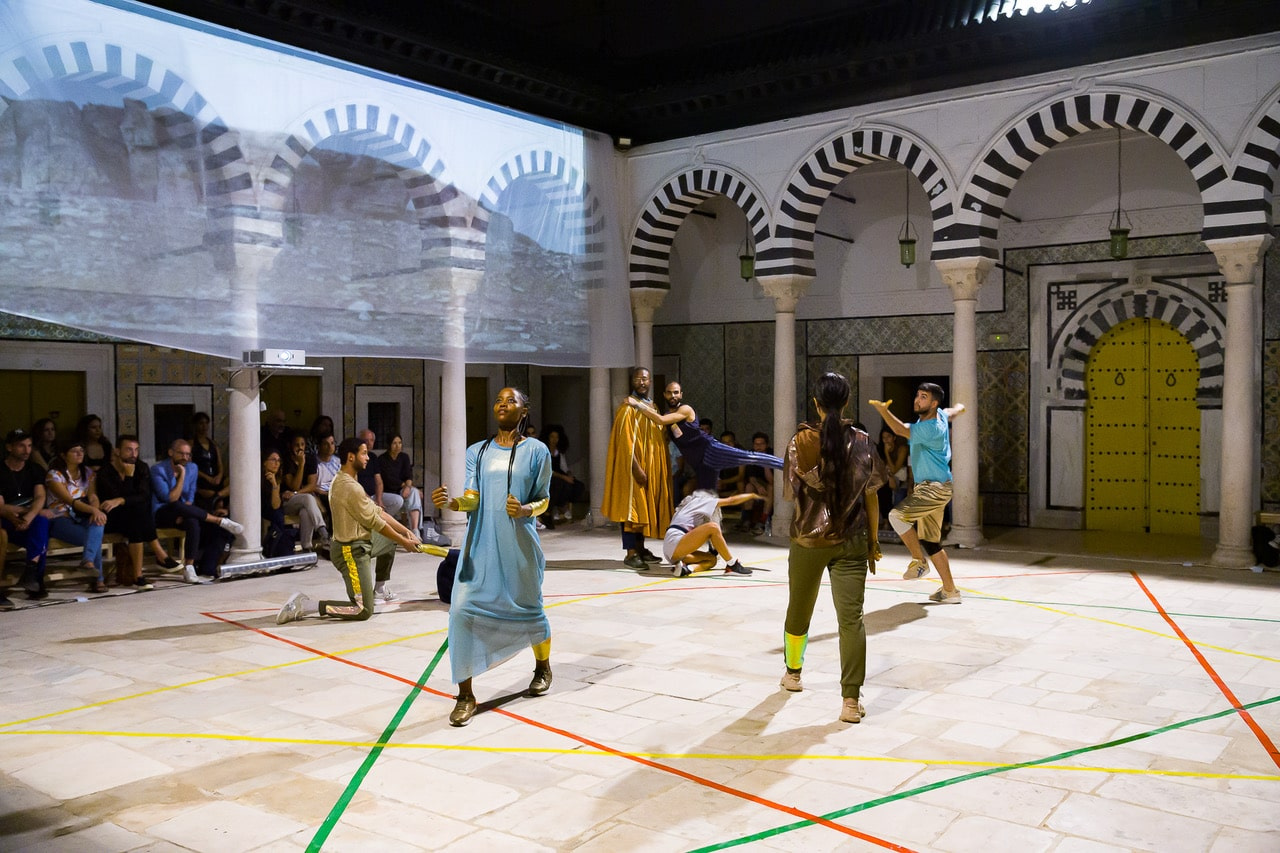
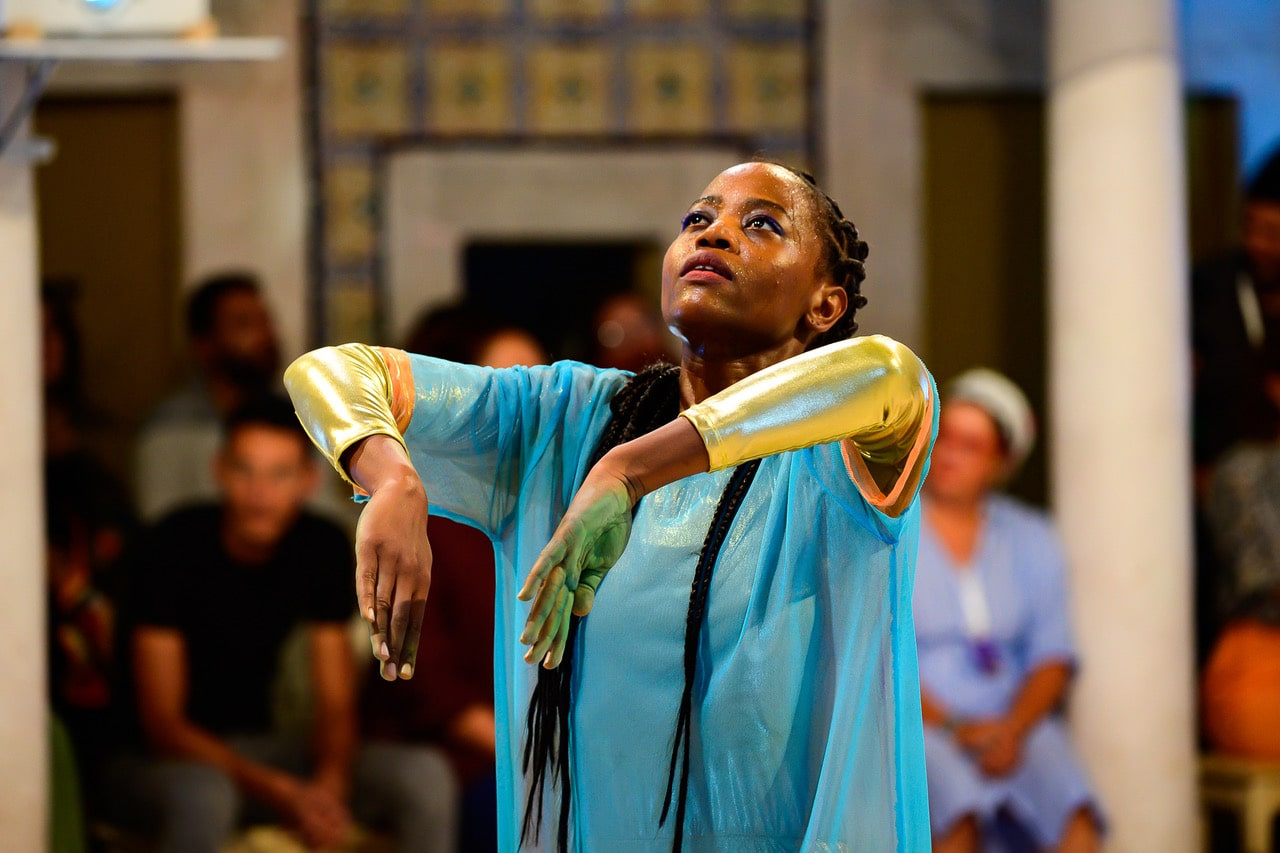
AKAL
(The Earth)
Kan choreografie de leemtes in ons historisch geheugen opvullen? In deze solo viert Mriziga de kracht van Neith in samenwerking met de Rwandese choreograaf, danser en zangeres Dorothée Munyaneza.
Rituelen, traditionele dansen, architectuur, verhalen, zang, poëzie, rap: in Akal komt alles samen in een intieme choreografische ruimte, waarin een nieuwe kijk op een onderdrukt verleden ons doet dromen van een meer inclusieve toekomst.
///
Can choreography close the gaps in our historical memory?
In this solo, Mriziga celebrates Neith’s strength in collaboration with the Rwandan choreographer, dancer and singer Dorothée Munyaneza.
Rituals, traditional dances, architecture, storytelling, song, poetry, rap: in Akal, everything comes together in an intimate choreographic space in which a fresh look at a suppressed past makes us dream of a more inclusive future.
credits and tour dates (click)
Ayur (The Moon)
︎︎︎
︎︎︎
